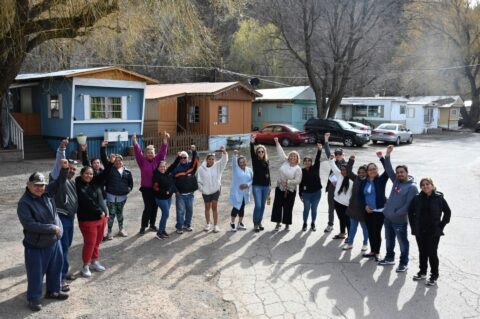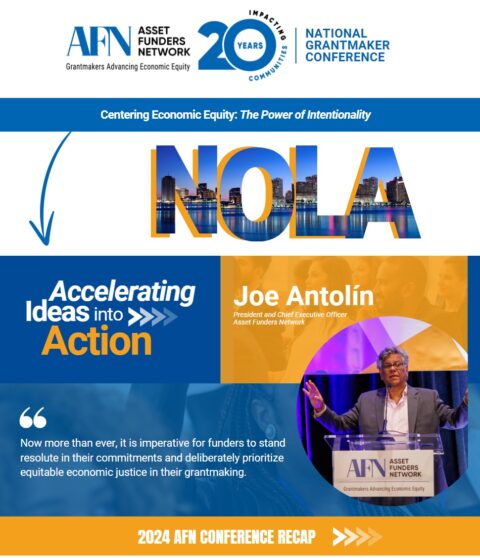 Meet our members! AFN’s greatest asset is our members—a diverse network of national, regional, and community-based foundations, financial institutions, and grantmakers—investing in advancing equitable wealth building and economic mobility. Check back each month and meet your peers!
Meet our members! AFN’s greatest asset is our members—a diverse network of national, regional, and community-based foundations, financial institutions, and grantmakers—investing in advancing equitable wealth building and economic mobility. Check back each month and meet your peers!
1: What is the mission of your organization and how is advancing equitable wealth building and economic mobility incorporated into the work?
AHF envisions a region where equitable health resources lead to universal health and well-being. We know that wealth and health are inextricably linked in this country and that wealth is unequally distributed largely due to historic and systemic racism. As a foundation we know that we will not achieve our mission to reduce health disparities and advance health equity unless we address wealth and income gaps. Through our grantmaking and impact investments, we support initiatives that create equitable workforce pathways, support a guaranteed income, and address affordability issues along the housing continuum.
2: What are some of the permanent pivots you have made as a result of the COVID-19 pandemic and the current moment emphasizing the critical need for strategies that provide a range of support to women and Black, Latinx, Indigenous and Asian people and communities?
At the time of COVID-19 outbreak, we had already started pivoting to a more intentional funding strategy that prioritizes eliminating racial disparities and the racial wealth gap. The pandemic dramatically exposed and exacerbated these gaps which further strengthened our commitment to these new investment priorities.
For example, during the pandemic, we shifted our annual core operating grant program called Mission Support to a multi-year general operating support grant to allow grantees to activate on programs more fully with the confidence that the funding would be in place for at least three years. Our Mission Support grantees range from social justice and grassroots organizations of color to organizations providing services addressing foster care, homelessness, trauma-informed care, mental health, and job training for the formerly incarcerated.
Through a racial equity lens, we apply an objective analysis to all our funding programs including impact investing and social innovation. One change we have made recently is a move towards resident-informed funding and participatory grantmaking. Community residents will increasingly become involved in several of our funding programs in support of ensuring an inclusive, diverse, and impactful grantmaking process.
3a: What are some of the most significant gaps that you have identified that could help address economic equity?
Solving for the racial wealth gap is key. Economic mobility and security have been a funding priority for us since early 2020. We are currently invested in affordable housing projects in support of low-income earners and the “missing middle,” a guaranteed income pilot in San Diego, and an income sharing agreement project which all help to address these longstanding income and wealth gaps.
3b: Thinking about your previous answer, what do you see as the biggest barriers or challenges for philanthropy to address these gaps?
Foundations have historically made annual community investments equivalent to approximately 5% of their endowments. This is not sufficient to make meaningful advancements in addressing the racial wealth gap. There needs to be an intentional transfer of wealth and power for systemic change to happen. For example, AHF has made a commitment to transfer 10% of its corpus to the rural border region of Imperial County which is a predominantly Hispanic and low-income farming community. A sister foundation, the Imperial Valley Wellness Foundation, is in its development phase and will be the recipient of these funds in the near future.
4: Is there a question you would like to raise to your funder colleagues?
As a philanthropic community, how do we do a better job of centering community voice and collective action to advance equitable wealth building and economic mobility?
5: What is the last book you read?
Letting Go by Meg Massey and Ben Wrobel
About Garrick Wong, Senior Director of Strategy, Alliance Healthcare Foundation
Alliance Healthcare Foundation (AHF) is a private foundation founded in 1982 and based in San Diego, California. We work to advance health and wellness for historically marginalized, under-resourced populations in San Diego and Imperial counties of California.
At AHF, my role is to provide ongoing strategic support, visionary leadership, technical capacity, and project management for the organization across a variety of issue areas in both our grantmaking programmatic work, as well as through our impact investment portfolio.

